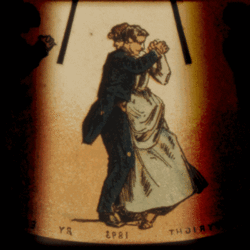Definify.com
Definition 2026
dejot
dejot
Latvian

Dejot
Verb
dejot tr. or intr., 2nd conj., pres. dejoju, dejo, dejo, past dejoju
- (intransitive) to dance (to move rhythmically, usually following music)
- viegli dejot ― to dance lightly, easily
- aizrautīgi dejot ― to dance enthusiastically
- dejojot aizmirsties ― to forget oneself dancing
- Vizma ar Gunāru dejoja vienā pārī ― Vizma and Gunārs danced as one couple
- (transitive) to dance (a specific dance)
- dejot valsi ― to dance the waltz
- dejot tautas dejas ― to dance a folk dance
- dejot spāņu deju ― to dance a Spanish dance
- viņa brīnišķīgi dejo krievu dejas ― she dances Russian dances wonderfully
- (transitive) to play a part in a ballet
- viņa dejos Odetu un Odīliju P. Čaikovska baletā “Gulbju ezers” ― she will play (lit. dance) Odeta and Odīlija in P. Čaikovskis' ballet “Swan Lake”
- (figuratively, of animals, fire, etc.) to dance (to move playfully, rhythmically, frenetically, etc.)
- otrā krastmalā dejo balts sermulītis ― on the other bank a little white stoat danced (= jumped around playfully)
- kļuva dzirdama virs puķu dobes dejojoša odu bara sīkšana ― the whizzing of a dancing swarm of mosquitos became audible over the flower beds
- rotaļīgas ēnas sāka dejot tumšajā laukumā ― playful shadows started dancing in the dark area
- pretī mājai uguns, liesmas dejoja un locījas līdzi gaisa plūsmām ― opposite the house (was) the fire, the flames danced and bent with the air currents
- to dance (to work in, to be a part of, a dance group)
- dejot baletā, koncertā ― to dance in the ballet, in the concert
- dejot pašdarbības ansamblī ― to dance in an amateur group
- māksliniece dejo operas un baleta teatrī ― the artist dances in the opera and ballet theater
Conjugation
conjugation of dejot
| INDICATIVE (īstenības izteiksme) | IMPERATIVE (pavēles izteiksme) |
||||
|---|---|---|---|---|---|
| Present (tagadne) |
Past (pagātne) |
Future (nākotne) |
|||
| 1st pers. sg. | es | dejoju | dejoju | dejošu | — |
| 2nd pers. sg. | tu | dejo | dejoji | dejosi | dejo |
| 3rd pers. sg. | viņš, viņa | dejo | dejoja | dejos | lai dejo |
| 1st pers. pl. | mēs | dejojam | dejojām | dejosim | dejosim |
| 2nd pers. pl. | jūs | dejojat | dejojāt | dejosiet, dejosit |
dejojiet |
| 3rd pers. pl. | viņi, viņas | dejo | dejoja | dejos | lai dejo |
| CONJUNCTIVE (atstāstījuma izteiksme) | PARTICIPLES (divdabji) | ||||
| Present | dejojot | Present Active 1 (Adj.) | dejojošs | ||
| Past | esot dejojis | Present Active 2 (Adv.) | dejodams | ||
| Future | dejošot | Present Active 3 (Adv.) | dejojot | ||
| Imperative | lai dejojot | Present Active 4 (Obj.) | dejojam | ||
| CONDITIONAL (vēlējuma izteiksme) | Past Active | dejojis | |||
| Present | dejotu | Present Passive | dejojams | ||
| Past | būtu dejojis | Past Passive | dejots | ||
| DEBITIVE (vajadzības izteiksme) | NOMINAL FORMS | ||||
| Indicative | (būt) jādejo | Infinitive (nenoteiksme) | dejot | ||
| Conjunctive 1 | esot jādejo | Negative Infinitive | nedejot | ||
| Conjunctive 2 | jādejojot | Verbal noun | dejošana | ||
Usage notes
In modern usage, dejot is the normal term for “to dance,” while diet often sounds old-fashioned or poetic in this sense, or then has the specific meaning of “to dance of joy.”
Synonyms
Derived terms
- prefixed verbs:
|
|
|
|
- other derived terms:
Related terms
References
- ↑ Karulis, Konstantīns (1992), “diet”, in Latviešu Etimoloģijas Vārdnīca (in Latvian), Rīga: AVOTS, ISBN 9984-700-12-7